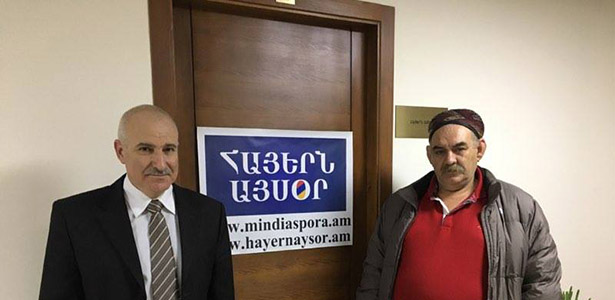Pyotr Akopov: “The Homeland is a feeling that words can’t describe”

Hayern Aysor’s correspondent sat down for an interview with the vice-presidents of the Erebouni Armenian National-Cultural Community of the city of Vladikavkaz of the Republic of Northern Osia-Alania, businessmen Pyotr Akopov and Vladimir Manasyan, who were hosted at the RA Ministry of Diaspora.
Karine Avagyan: Mr. Akopov, are you in Armenia on a business trip?
Pyotr Akopov: Yes, but I had also missed the Homeland. Our visit is in the interests of our community because we live for the community and do our best to solve its problems. The main purpose of our visit is to have the building of the local Armenian school returned to our community. It will serve as a cultural center for the community where we will consolidate all the cultural institutions of the community, organize events, host meetings, receive guests, actors and singers and provide rooms for our community’s choir and dance group to rehearse. So, we are here to ask the Ministry of Diaspora to collaborate with us and help us solve this problem. We are in touch with the representative of the relevant department of the Ministry, Sergey Sarukhanyan, and the Ministry has helped us with everything. The children of our community participate in the very beloved “Ari Tun” Program, which is a very successful program, and we would like it to be ongoing.
Karine Avagyan: You don’t speak Armenian. Have you forgotten the native language?
P. A.: I haven’t forgotten it. I understand it, but I was born and raised in Vladikavkaz and didn’t receive an Armenian education. I taught myself to read, write and speak Armenian (of course, I am ashamed to speak the Armenian I know). Armenian became a household language in our family through my daughter-in-law from Armenia, and now my grandchild speaks Armenian. There are no Armenian-populated districts in Vladikavkaz, though there are many Armenians in our area. There are many mixed marriages. I can’t say that all the Armenians of Vladikavkaz live as Armenians. We have the St. Gregory the Illuminator Church and an Armenian Sunday school where the children learn Armenian. This is also serves as an opportunity for them to preserve the language. Our community also has a newspaper. So, there are preconditions for the preservation of the Armenian identity.
Karine Avagyan: Dear compatriot, please, tell us about the relations between the Armenian community and other communities in Vladikavkaz, especially the Azerbaijani community. Weren’t there any problems in relation to the Four-Day Artsakh War?
P. A.: There are different communities, including an Azerbaijani community with which we have normal relations. It’s obvious that the relations couldn’t be normal in Armenia, but let’s not forget that we live in a totally different republic. I must say that the Armenians outnumber the Azerbaijanis in Vladikavkaz.
Karine Avagyan: How do you feel after landing in Yerevan? Where do you want to go first?
P. A.: I always have different feelings and want to visit different places, but I feel the scent and the air of Armenia first…
What does the Homeland mean to you?
P. A.: The Homeland is a feeling that words can’t describe. It is hard for me to say.
I continued my interview with vice-president of Erebouni Armenian National-Cultural Autonomy, builder Vladimir Manasyan, who modestly kept silent about his charities, including the moral and material assistance that he has provided to drivers and passengers stuck in snow on the Lars road throughout the years. He also didn’t talk about the Nubar Pasha Medal of the RA Ministry of Diaspora that he has received for his humanitarian acts. It was hard for me to receive information about how they visited Talish to provide assistance during the days of the Four-Day Artsakh War when there were no more residents and they had been settled in Charentsavan. These honorable Armenians have distributed the funds raised by the Armenian community and their personal funds to the residents of Talish who lost soldiers, whose sons were wounded and who had to leave their birthplace with sorrow…Real benevolence is truly the benevolence that doesn’t need to be heard or spoken about, but is only for broken hearts and sad eyes.
Karine Avagyan




 Արևելահայերեն
Արևելահայերեն Արևմտահայերեն
Արևմտահայերեն Русский
Русский






